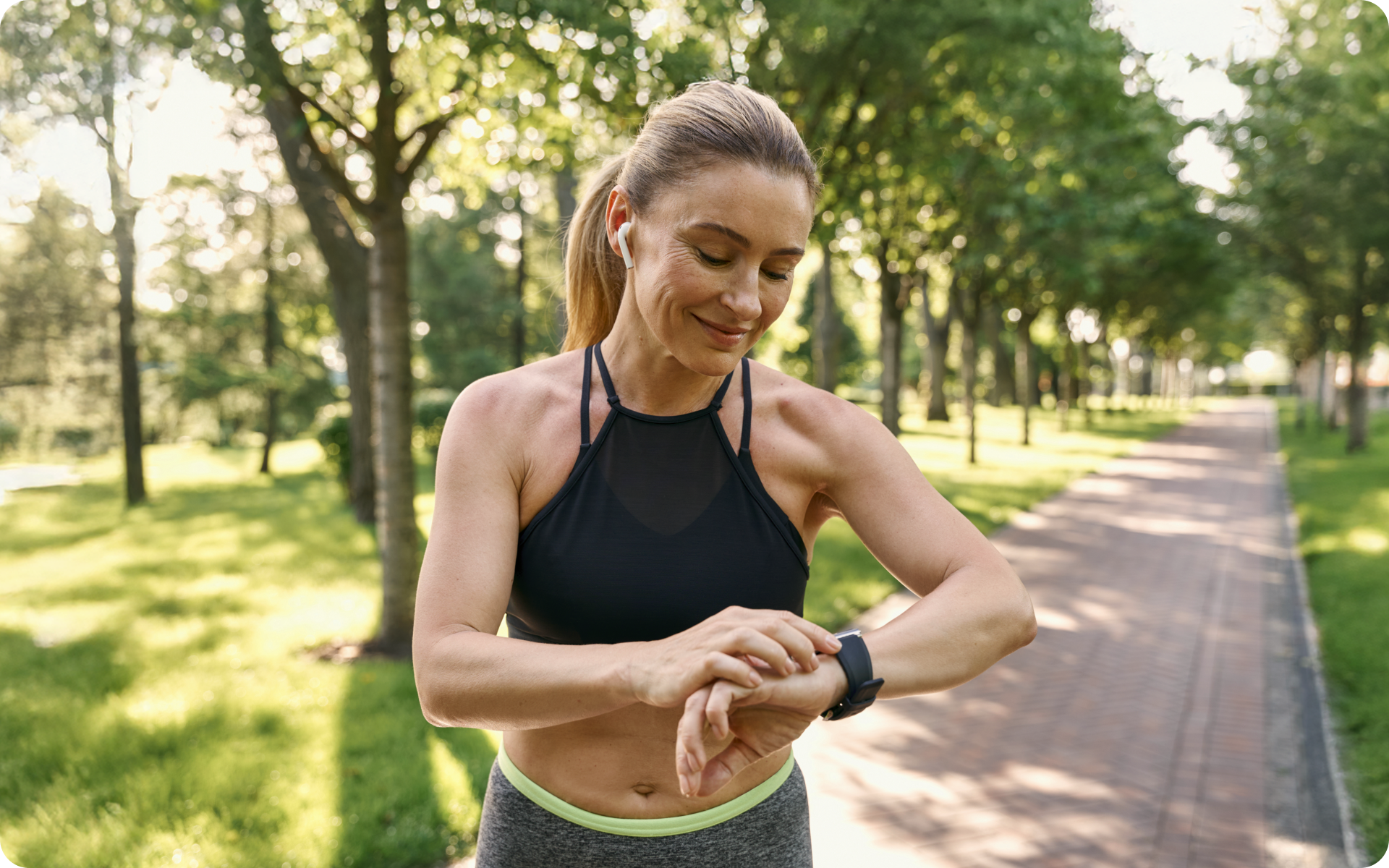Exercise doesn’t have to be grueling to benefit you. There, we said it.
In a world where the most popular fitness trends involve high-intensity workouts that leave you dripping in sweat and gasping for air, it’s easy to forget the simple act of walking.
But daily walking for just 15 minutes can benefit your physical and mental health.
We don’t move as much as we should.
Thanks to technology and modern conveniences, we spend most of our days sitting at a desk, in front of the TV, or on a commute.
Health experts have linked this sedentary lifestyle to numerous health issues, including obesity, heart disease, and even an increased risk for certain types of cancer.
But by incorporating just 15 minutes of walking into your daily routine, you can combat these adverse effects and improve your overall health.
Here are some reasons why walking is good for you:
Why Is It Important To Walk Every Day?
Daily walking is easy, accessible, and downright enjoyable to nurture your body and mind.
Whether you’re:
- Walking your dog
- Strolling through a park
- Pacing around your neighborhood
Here’s why this simple activity is so essential for your health:
1. Boosts Your Heart Health
Walking is fantastic for your heart.
It gets your blood flowing, helps lower bad cholesterol, and even reduces your risk of heart disease and stroke (1).
Just 15-30 minutes of brisk daily walking can:
- Improve circulation
- Strengthen your cardiovascular system
- Give your heart the workout it needs without overdoing it.
2. Supports Mental Well-Being
Sometimes, life gets overwhelming, and walking can work wonders.
The rhythmic nature of walking can:
- Reduce stress
- Calm your mind
- Combat symptoms of anxiety and depression (2).
- A walk in nature can also lift your mood and spark creativity. It’s like free therapy with a view!
3. Helps With Weight Management
Walking is your best friend if you’re looking for a low-impact way to stay active.
It burns calories, helps manage weight, and boosts metabolism. Pair your daily walk with a balanced diet, and you’ll be on track to maintaining a healthy weight without overcomplicating things (3).
4. Reduces The Risk Of Chronic Diseases
Daily walking is like giving your future self a healthier life.
Studies show that regular walking lowers the risk of chronic conditions such as:
- Diabetes
- Hypertension
- Some cancers
It also strengthens your bones and muscles, reducing the likelihood of injuries or age-related issues like osteoporosis (4).
BetterMe will shake off your mental funk, rid you of your energy-zapping habits, and help you sculpt the body of your dreams. Intrigued? Hurry up and change your life for the better!
5. It’s Simple And Accessible
One of the best things about walking is how easily it fits into your day.
You don’t need fancy gym memberships or expensive equipment—just a comfortable pair of shoes, and you’re good to go.
Walking is an activity for all ages and fitness levels, making it one of the most inclusive forms of exercise.
Remember, walking every day isn’t about hitting a specific step count—it’s about moving your body regularly and reaping the health benefits, one step at a time. It’s simple, achievable, and so worth it.
Is A 15 min Walk A Day Enough?
Many search the internet for questions like “Is walking 15 minutes a day enough?”
Although a 15-minute walk can help maintain a basic level of health, increasing your time or pace can amplify the benefits.
For example, adding 5-10 minutes or trying interval walking (alternating between slow and brisk paces) can boost cardiovascular health and calorie burn.
Experts recommend at least 150 minutes of weekly moderate-intensity exercise (5) for overall fitness. Your 15-minute walk can count toward that, helping you build a healthier and more active lifestyle.
The best exercise routine is the one you’ll follow.
If walking 15 minutes a day to lose weight is manageable for you right now, then that’s enough. It’s better to start small than to do nothing at all.
Over time, as it becomes part of your daily rhythm, you can expand and adapt based on your goals and abilities.
Remember, there’s no “perfect” exercise routine—it’s all about listening to your body and doing what you can.
Read more: 4 Week Walking Plan for Beginners: Schedule, Tips and FAQ
Can You Lose Weight Walking 15 Minutes A Day?
Those with similar body goals will ask, “Does walking 15 minutes a day help lose weight?”
Walking 15 minutes doesn’t require a huge commitment, and that’s what makes it sustainable.
It’s low-impact, gentle on your joints, and fits even the busiest schedule. If weight loss feels daunting, starting small with a daily walk can help you build momentum and confidence.
At its core, weight loss is about balancing the calories you consume and the calories you burn. Walking is an easy, enjoyable way to slowly but surely tip the scales in your favor.
A brisk 15-minute walk can burn 50-100 calories, depending on your:
- Pace
- Weight
- Intensity
While the calorie burn amount may not seem like much initially, those calories add up with regular walks (6).
Over a week, that’s up to 700 calories—or more if you gradually increase your speed or add inclines like hills.
Pair walking with other daily movements to create a solid foundation for an active lifestyle.
While walking is an excellent starting point, it’s most effective when combined with other weight-loss strategies.
A healthy, well-balanced diet is vital, as you can’t out-walk a poor diet.
Focus on eating whole, nutrient-rich foods and controlling portion sizes to create a calorie deficit.
Minor lifestyle tweaks like:
- Drinking more water
- Getting enough sleep
- Cutting back on sugary drinks
These can all amplify the effects of walking.
Add some strength training or other forms of exercise, and you’ll build muscle, boosting your body’s ability to burn calories even at rest.
If you stick with your fitness routine and healthy habits, you’ll be amazed at how even 15 minutes of daily walking can contribute to a healthier, happier you.
Does Walk Reduce Belly Fat?
Walking can help reduce belly fat, but it’s essential to understand how it works.
While you can’t target fat loss in one area—like your belly—walking contributes to overall fat loss, including reducing the fat around your midsection over time.
Here’s how walking can play a key role in slimming down your waistline:
- Walking Contributes To Overall Fat Loss
Walking is a great way to create a calorie deficit, which is the key to fat loss.
When you burn more calories than you consume, your body uses stored fat for energy, leading to weight loss, including belly fat.
A brisk walk increases your heart rate and burns calories, making it an effective and sustainable way to shed excess fat (3).
- Walking Relieves Stress
High-stress levels can produce cortisol, a hormone that stores fat around the midsection (7).
Walking is an excellent way to reduce stress and lower cortisol levels, especially in a serene or natural setting.
The rhythmic movement, fresh air, and mental clarity you gain from walking can help your body work more efficiently and reduce stress-induced belly fat (8).
Read more: How to Get 10,000 Steps a Day? Tips and Tricks
How Many Steps Is A 15-Minute Walk?
The number of steps you take during a 15-minute walk depends on your:
- Walking speed
- Stride length
- Terrain
Here’s a general guide to help you estimate your step count and make the most of your walk:
Step Counts by Walking Pace
- Slow Pace (2-2.5 mph): If you’re leisurely walking, you’ll likely cover around 1,200 to 1,500 steps in 15 minutes.
- Moderate Pace (3-3.5 mph): At a steady, moderate pace, most people take about 1,800 to 2,000 steps in the same time frame.
- Brisk Pace (4+ mph): Quickly moving can boost your step count to 2,200 or more during your 15 minutes of walking.
These estimates can vary based on your stride length. Taller people take fewer steps to cover the same distance, while shorter strides naturally result in more steps.
Factors Affecting Step Count
- Stride Length: Longer strides mean fewer steps, while shorter strides lead to more steps covering the same distance.
- Walking Speed: The faster you walk, the more ground you’ll cover, increasing your step count.
- Terrain: Flat surfaces allow for a steady stride, but walking uphill or on uneven terrain can change your pace and step rhythm.
Track Your Steps
If you’re curious about exactly how far you’re walking, a pedometer, fitness tracker, or smartphone app can be a fun and easy way to keep track of your steps.
Nowadays, most smartphones have built-in health apps that count daily steps, making setting goals and monitoring progress simple.
Many health experts recommend aiming for 10,000 daily steps, but every little bit helps.
A 15-minute walk—1,200 or 2,200 steps—is a great way to work toward that goal and keep moving toward better health. Plus, seeing your step count climb over time can be incredibly motivating.
BetterMe: Health Coaching app helps you achieve your body goals with ease and efficiency by helping to choose proper meal plans and effective workouts. Start using our app and you will see good results in a short time.
Which Is Best, Morning Or Evening Walking?
The best time to walk—morning or evening—depends on what works best for your lifestyle and preferences. Both times have unique benefits, so it’s not about which is better but what suits you.
Here’s a comparison to help you decide:
Benefits Of Morning Walks
- Energy Boost: A morning walk can jumpstart your day, wake your body, and give you a natural energy kick without caffeine. It’s a great way to clear your mind and set a positive tone for the hours ahead.
- Cooler Temperatures: If you live in a warm climate, mornings are often cooler and more pleasant for outdoor activities.
- Better Air Quality: Air tends to be fresher in the early hours as there’s usually less traffic and pollution. If clean air motivates you, this could be the perfect time to walk.
- Builds Discipline: Something is rewarding about checking off your workout first thing in the morning. It helps establish a healthy routine and reduces the chance of skipping it as the day gets busy.
Benefits Of Evening Walks
- Stress Relief: After a long day, an evening walk can help you unwind, calm your mind, and release pent-up tension. It’s like a moving meditation to leave the day’s worries behind.
- Warmer Muscles: Your body is naturally warmer later in the day, which makes walking feel more comfortable and reduces muscle stiffness.
- Better Sleep: A calming stroll in the evening may help prepare your body and mind for a good night’s sleep. Just make sure it’s not too intense before bedtime.
- Flexible Schedule: Evenings provide more free time than mornings, especially for those with early work or family commitments.
Discover Types Of Walking Styles, from brisk walking for fitness to power walking for calorie burning and mindful walking for stress relief.
Factors To Consider
- Your Energy Levels: Are you more alert and motivated in the morning, or do you feel more relaxed and ready to move in the evening? Tune into your natural rhythm to decide which time makes you feel your best.
- Weather Conditions: If mornings are too cold or evenings too dark where you live, consider safety and comfort when choosing your timing.
- Personal Schedule: The best time to walk is when you can consistently do so. Whether it’s before work, during a lunch break, or after dinner, make it work for you.
Yes, you can walk on an empty stomach, especially in the morning. This practice is known as fasted walking and can help burn fat as your body uses stored energy (9). However, if you feel lightheaded or weak, having a small snack before walking is better. Yes, two 15-minute walks can provide similar health benefits as one 30-minute walk. Splitting your exercise into shorter sessions still helps burn calories, improve cardiovascular health, and boost energy levels throughout the day. We’ve discussed Nordic Walking Benefits, such as its ability to engage multiple muscle groups, improve overall fitness, and burn more calories than regular walking, in detail. After a morning walk, hydrate with a glass of water, stretch to prevent stiffness, and eat a balanced meal to refuel your body. These habits can replenish energy and support recovery after exercise. Remember that many of us will get thousands of additional steps naturally throughout our day, so not all walking needs to be purposeful, fitness-oriented walking to count towards our goals! Most step recommendations fall between 7,000 and 10,000 steps per day, equivalent to walking 4 miles a day or 3.5-5 daily miles. Some individuals with very active jobs, tasks, or hobbies may achieve that goal without going for a walk, but most of us will need to put in a little extra effort to get there.Frequently Asked Questions
Can I walk on an empty stomach?
Are two 15-minute walks as good as one 30-minute walk?
What to do after a morning walk?
What is a good distance to walk every day?
Given this, most people’s daily walks should be 1.5 to 3 miles, which translates to 30 to 60 minutes, depending on their pace. Aim for a distance that matches your fitness level and goals, and gradually increase it over time.
The Bottom Line
The most crucial part of any exercise routine is sticking to it. While a 15-minute walk may not transform your fitness overnight, daily practice builds discipline and keeps your metabolism engaged. Consistency keeps your heart healthy, your muscles working, and your energy levels steady.
There is no “perfect” time to walk that applies to everyone. Both morning and evening walks offer fantastic health benefits, from improved mood to better cardiovascular health. The most important thing is to lace up your shoes and get moving, whether the sun is rising or setting.
DISCLAIMER:
This article is intended for general informational purposes only and does not serve to address individual circumstances. It is not a substitute for professional advice or help and should not be relied on for making any kind of decision-making. Any action taken as a direct or indirect result of the information in this article is entirely at your own risk and is your sole responsibility.
BetterMe, its content staff, and its medical advisors accept no responsibility for inaccuracies, errors, misstatements, inconsistencies, or omissions and specifically disclaim any liability, loss or risk, personal, professional or otherwise, which may be incurred as a consequence, directly or indirectly, of the use and/or application of any content.
You should always seek the advice of your physician or other qualified health provider with any questions you may have regarding a medical condition or your specific situation. Never disregard professional medical advice or delay seeking it because of BetterMe content. If you suspect or think you may have a medical emergency, call your doctor.
SOURCES:
- Walking as an Opportunity for Cardiovascular Disease Prevention (2019, cdc.gov)
- Walking on sunshine: scoping review of the evidence for walking and mental health (2018, nih.gov)
- Appropriate Physical Activity Intervention Strategies for Weight Loss and Prevention of Weight Regain for Adults (2009, sportmedicine.ru)
- Walking helps prevent chronic disease (2023, msu.edu)
- American Heart Association Recommendations for Physical Activity in Adults and Kids (2024, heart.org)
- Calories burned in 30 minutes for people of three different weights (2021, harvard.edu)
- Stress and abdominal Fat: Preliminary Evidence of Moderation by the Cortisol awakening Response in Hispanic Peripubertal Girls (2011, nih.gov)
- Impact of a stress management program on weight loss, mental health and lifestyle in adults with obesity: a randomized controlled trial (2018, nih.gov)
- The effect of brisk walking in the fasted versus fed state on metabolic responses, gastrointestinal function, and appetite in healthy men (2018, nature.com)












